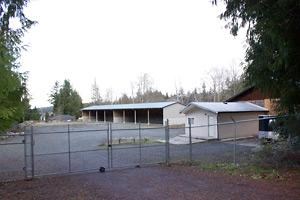Abaca Pharmaceuticals Inc. has issued a notice to Powell River Regional District advising that it has acquired a property at 2815 McCausland Road to establish a licensed medical marijuana production business, under new federal regulations.
Company CEO Roger Proctor said that while Abaca Pharmaceuticals has not been pre-approved, it has been working closely with the regional district and with Health Canada as it moves forward in the application process.
The newly acquired site is near the entrance to Myrtle Point Golf Course, at the site of the former P & R Ready Mix, and more recently, Adam’s Storage facility.
“Do we anticipate approval? The answer to that is yes,” Proctor said. “If all continues to go well moving forward, we will be a significant employer in the region.”
Leading the project are Kevin Lowe, quality control and regulatory affairs manager, formerly with a notable international pharmaceutical distributor; Mark Poirier, general council, formerly with a large international law firm; and Proctor, businessman and lawyer.
Proctor said they chose Powell River because of the relatively remote location. “This brings with it obvious benefits,” he said “We won’t have the security issues that more central communities might have.”
Once the facility is in production, Proctor said he expects it will provide up to 70 jobs. “We intend to hire most, if not all, of the available positions from within Powell River, right from building the three-phase construction project, right down to the actual day-to-day operations,” he said. “We’ll need to hire local couriers as well. All of our security personnel will be hired locally and there’ll likely be accounting and other professional service needs as things progress.”
Once production is complete, the medicine produced at the site would be distributed from within the secure compound.
“We’ve reached out to the community and to various services in the area, from the Powell River Chamber of Commerce, to RCMP, fire services and to the regional district office itself.”
Proctor said the company felt as though people in Powell River were hard-working and entrepreneurial—qualities it was looking for when it set out to find an optimum location. He went on to point out that medicinal marijuana production is a viable industry that can have a positive impact on the community, while providing relief to people who need the medication. Patients who use medical marijuana typically use up to several grams a day to manage a broad range of symptoms, including cancer-related pain and nausea.
“Every aspect of the business will be closely regulated and monitored by the RCMP and by Health Canada inspectors through every phase of operation,” said Proctor. “All material waste is weighed to the gram and inventoried and must be destroyed on site. The operation is odour-free and non-polluting.”
The new licencing regime will be in place by April 2014, when Health Canada phases out the old system that relied mostly on small-scale grow operations that often produced product of varying quality. Further problems arose when it was discovered that some growers were illegally diverting product to the black market.
New regulations are intended to facilitate what Health Canada calls an emerging legitimate commercial industry. In 2002, there were only 500 registered users of medical marijuana in Canada. Today there are as many as 37,000. That number may jump to as high as 450,000 by 2024, when the industry is expected to generate as much as $1.3 billion in revenue.
From some 4,200 licensed growers in Canada under the old regulations, as of November 2013, there were only 170 applications made under the new guidelines, only a percentage of which will actually be successful in their bid to produce and distribute medical marijuana.



